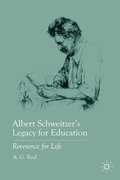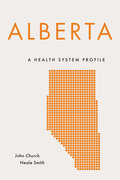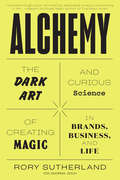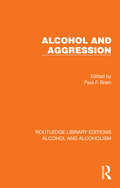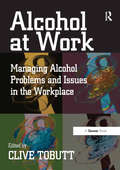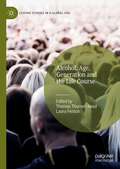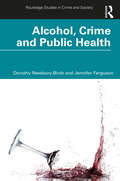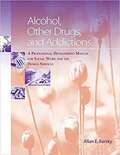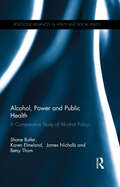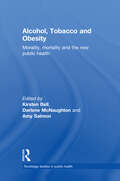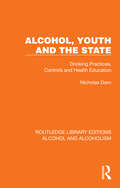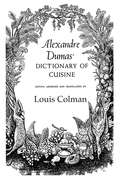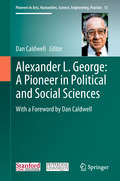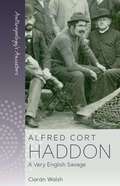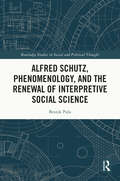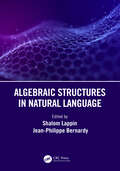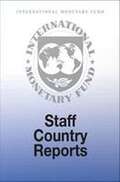- Table View
- List View
Albert Schweitzer’s Legacy for Education
by A. G. RudThis is the first book devoted to the study of the thought of Albert Schweitzer as it relates to educational theory and practice. Rud argues that Schweitzer's life and work offer inspiration and timely insights for both educational thought and practice in our new century.
Alberta: A Health System Profile (Provincial and Territorial Health System Profiles)
by John Church Neale SmithAlberta: A Health System Profile provides the first detailed description of Alberta’s health care system and the underpinning political and social forces that have shaped it. Drawing on significant wealth from government revenues generated through the energy sector, Alberta has been able to develop an extensive public health and health care infrastructure. Alberta has used its financial resources to attract health professionals by offering the highest levels of financial compensation in Canada. However, although it spends more per capita than other Canadian jurisdictions, Alberta’s health care system costs and health outcomes are mediocre compared to those of many other Canadian jurisdictions. This unexpected outcome is the consequence of the unique interplay of economic and political forces within Alberta’s political economy. Through an examination of Alberta’s political and economic history, and using research on the structures and services provided, Alberta: A Health Systems Profile provides a detailed description of the programs and services that constitute Alberta’s health care system.
Alchemy, Paracelsianism, and Shakespeare’s The Winter’s Tale (Palgrave Studies in Literature, Science and Medicine)
by Martina ZamparoThis book explores the role of alchemy, Paracelsianism, and Hermetic philosophy in one of Shakespeare’s last plays, The Winter’s Tale. A perusal of the vast literary and iconographic repertory of Renaissance alchemy reveals that this late play is imbued with several topoi, myths, and emblematic symbols coming from coeval alchemical, Paracelsian, and Hermetic sources. It also discusses the alchemical significance of water and time in the play’s circular and regenerative pattern and the healing role of women. All the major symbols of alchemy are present in Shakespeare’s play: the intertwined serpents of the caduceus, the chemical wedding, the filius philosophorum, and the so-called rex chymicus. This book also provides an in-depth survey of late Renaissance alchemy, Paracelsian medicine, and Hermetic culture in the Elizabethan and Jacobean ages. Importantly, it contends that The Winter’s Tale, in symbolically retracing the healing pattern of the rota alchemica and in emphasising the Hermetic principles of unity and concord, glorifies King James’s conciliatory attitude.
Alchemy: The Dark Art and Curious Science of Creating Magic in Brands, Business, and Life
by Rory SutherlandHOW DOES MAGIC HAPPEN? The Ogilvy advertising legend—“one of the leading minds in the world of branding” (NPR)—explores the art and science of conjuring irresistible products and ideas."A breakthrough book. Wonderfully applicable to about everything in life." —Nassim Nicholas Taleb, author of The Black Swan“Veins of wisdom emerge regularly and brilliantly from these pages. Don't miss this book.” —Robert B. Cialdini, author of InfluenceWhy is Red Bull so popular, though everyone—everyone!—hates the taste? Humans are, in a word, irrational, basing decisions as much on subtle external signals (that little blue can) as on objective qualities (flavor, price, quality). The surrounding world, meanwhile, is irreducibly complex and random. This means future success can’t be projected on any accounting spreadsheet. To strike gold, you must master the dark art and curious science of conjuring irresistible ideas: alchemy.Based on thirty years of field work inside the largest experiment in human behavior ever conceived—the forever-unfolding pageant of consumer capitalism—Alchemy, the revolutionary book by Ogilvy advertising legend Rory Sutherland, whose TED talks have been viewed nearly seven million times, decodes human behavior, blending leading-edge scientific research, absurdly entertaining storytelling, deep psychological insight, and practical case studies from his storied career working on campaigns for AmEx, Microsoft, and others.Heralded as “one of the leading minds in the world of branding” by NPR, Sutherland is a unique thought leader, as comfortable exchanging ideas with Nobel Prize winners Daniel Kahneman and Richard Thaler (both interviewed in these pages) as he is crafting the next product launch. His unconventional and relentlessly curious approach has led him to discover that the most compelling secrets to human decision-making can be found in surprising places:What can honey bees teach us about creating a sustainable business?How could budget airlines show us how to market a healthcare system?Why is it better to be vaguely right than precisely wrong?What might soccer penalty kicks teach us about the dangers of risk-aversion?Better “branding,” Sutherland reveals, can also be employed not just to sell products, but to promote a variety of social aims, like getting people to pay taxes, improving public health outcomes, or encouraging more women to pursue careers in tech. Equally startling and profound, Sutherland’s journey through the strange world of decision making is filled with astonishing lessons for all aspects of life and business.
Alcohol and Aggression (Routledge Library Editions: Alcohol and Alcoholism)
by Paul F. BrainIn the 1980s the relationship between alcohol and aggression and violence was a controversial one. Much of previous thinking had been based on anecdotal evidence. In contrast this book, originally published in 1986, is based upon recent scientific evidence from a broad range of studies from animal experimentation to clinical and social research. The initial chapters describe what aggression is, in terms of theories of animal behaviour, how alcohol influences neural and endocrine functions and behaviour and how problematic it often is to extrapolate from animal research to humans. Later chapters give critical reviews of attempts to relate alcohol intake to violence and crime. The book represents a major synthesis of work from many disciplines and will interest workers in animal behaviour, alcohol studies, psychopharmacology and social psychology.
Alcohol at Work: Managing Alcohol Problems and Issues in the Workplace
by Clive TobuttIn the European Union many individuals will partake in drinking a little wine with their lunch or dinner to aid their enjoyment of the meal or as an appetizer for food. Alcohol is also a drug of dependence. Some individuals will drink too much and some of them will become addicted. Access to alcohol, binge drinking, and younger drinkers can lead to unsafe workplaces, absenteeism, fraud and criminal behaviour. Alcohol at Work is a definitive guide to the problem, exploring its nature and scale and providing a complete range of ideas and techniques to help create a policy in the workplace and develop appropriate and effective measures for monitoring and tackling alcohol abuse. The key collective message is solve the problem - take the alcohol, not the person, out of the workplace. In the UK alone, research puts the cost of alcohol abuse in the workplace at £2 billion a year. This is a must-have reference for human resource, occupational health and risk managers, as well as those involved in tackling criminal behaviour such as fraud and violence at work resulting from alcohol abuse and addiction.
Alcohol at Work: Tackling Workplace Drinking to Improve Wellbeing
by Lauren BookerFrom uninsured losses to workplace injuries, from absenteeism to addiction, alcohol consumption can have a major impact on the workplace. Lost productivity alone costs the UK economy more than £7 billion annually. What’s more, the impact of alcohol abuse on the employee and those around them is a wellbeing issue that all employers need to be alert to, especially with many now choosing to work from home.Alcohol at Work: Tackling Workplace Drinking to Improve Wellbeing will guide health and safety professionals through the practical steps that they can take to mitigate risk and improve wellbeing, safeguarding and inclusivity. The book explores key topics such as driving legislation, the use of alcohol testing, stressful jobs and designing and implementing an alcohol policy that uses practical examples that highlight common workplace scenarios. It translates evidence-based research into workable solutions using tools that enable organisations to influence workplace culture, policies and practices so they can meet their legal obligations and ensure a thriving workforce. It delves into the legal aspects of alcohol abuse at work, offering treatment and adopting an alcohol and wellbeing policy for a business. This comprehensive guide will help the reader to understand and adopt practices that mitigate the risks of employees developing an alcohol problem and ensure that employers can tackle the issue head-on should it arise.This book is an essential read for any professional in occupational health and safety, human resources, business and management, policy creation, insurance and corporate governance.
Alcohol, Age, Generation and the Life Course (Leisure Studies in a Global Era)
by Thomas Thurnell-Read Laura FentonThis volume explores generational differences in alcohol consumption practices and examines the changing role of alcohol across the life course. It considers generational patterns in where, how and why people buy and consume alcohol and how these may interact with identity and belonging and considers how drinking alcohol in adolescence, adulthood, middle-age or later life takes on different functions, meanings and tensions. Alcohol is shown to play an important role in biographical transitions, such as in the coming of age rituals that mark the passage from adolescences to adulthood, whilst drinking alcohol in adulthood and in later life takes on new meanings, pleasures and risks in light of shifting roles and responsibilities relating to work, leisure and the family. The empirically-informed contributions draw on a range of diverse disciplinary backgrounds and a range of cultural contexts provides a nuanced examination of the role of alcohol at different life course stages and explores both continuity and change between generations.
Alcohol, Crime and Public Health (Routledge Studies in Crime and Society)
by Dorothy Newbury-Birch Jennifer FergusonAlcohol, Crime and Public Health explores the issue of drinking in the criminal justice system, providing an overview of the topic from both a criminal justice and a public health perspective. The majority of prisoners in the UK (70%) have an alcohol use disorder, and evidence tells us that risky drinking is high amongst those in contact with all areas of the criminal justice system. Uniquely, this book brings both a criminal justice and a public health perspective to the topic. The book opens by exploring the levels of crime attributed to alcohol, the policy context of alcohol and crime, and the prevalence of risky alcohol consumption in the criminal justice system. The following chapters examine risky drinking amongst men, women and young people in the criminal justice system. The final chapters look at the efficacy of psychosocial interventions for risky drinking in the criminal justice system, and look forward to how researchers and practitioners can work together to produce research in the criminal justice system. Written in an accessible and concise style, Alcohol, Crime and Public Health will be of great use to students of criminology, criminal justice and public health as well as the wider area of public and social policy in relation to alcohol and crime.
Alcohol, Other Drugs and Addictions: A Professional Development Manual for Social Work and the Human Services
by Allan Edward BarskyTo help prepare you for the realities of working with clients affected by addictions, this beneficial text provides you with the necessary tools needed to competently translate addictions theory into practice. It offers a thorough examination of a range of models and perspectives for helping, and it encourages critical thinking to best match approaches with clients and situations. Presented in a work-text format, this book is full of cases, exercises, role-plays, and questions to increase your understanding of concepts and application to practice.
Alcohol, Power and Public Health: A Comparative Study of Alcohol Policy
by Shane Butler Betsy Thom James Nicholls Karen ElmelandIn recent years, the reduction of alcohol-related harm has emerged as a major policy issue across Europe. Public health advocates, supported by the World Health Organisation, have challenged an approach that targets problem-drinking individuals, calling instead for governments to control consumption across whole populations through a combination of pricing strategies, restrictions on retail availability and marketing regulations. Alcohol, Power and Public Health explores the emergence of the public health perspective on alcohol policy in Europe, the strategies alcohol control policy advocates have adopted, and the challenges they have faced in the political context of both individual states and the European Union. The book provides a historical perspective on the development of alcohol policy in Europe using four case studies – Denmark, England, Scotland and Ireland. It explores the relationship between evidence, values and power in a key area of political decision-making and considers what conditions create – or prevent – policy change. The case studies raise questions as to who sets policy agendas, how social problems are framed and defined, and how governments can balance public health promotion against both commercial interests and established cultural practices. This book will be of interest to academics and researchers in policy studies, public health, social science, and European Union studies.
Alcohol, Tobacco and Obesity: Morality, mortality and the new public health
by Amy Salmon Kirsten Bell Darlene McNaughtonAlthough drinking, smoking and obesity have attracted social and moral condemnation to varying degrees for more than two hundred years, over the past few decades they have come under intense attack from the field of public health as an 'unholy trinity' of lifestyle behaviours with apparently devastating medical, social and economic consequences. Indeed, we appear to be in the midst of an important historical moment in which policies and practices that would have been unthinkable a decade ago (e.g., outdoor smoking bans, incarcerating pregnant women for drinking alcohol, and prohibiting restaurants from serving food to fat people), have become acceptable responses to the 'risks' that alcohol, tobacco and obesity are perceived to pose. Hailing from Canada, Australia, the United Kingdom and the USA, and drawing on examples from all four countries, contributors interrogate the ways in which alcohol, tobacco and fat have come to be constructed as 'problems' requiring intervention and expose the social, cultural and political roots of the current public health obsession with lifestyle. No prior collection has set out to provide an in-depth examination of alcohol, tobacco and obesity through the comparative approach taken in this volume. This book therefore represents an invaluable and timely contribution to critical studies of public health, health inequities, health policy, and the sociology of risk more broadly.
Alcohol, Youth and the State: Drinking Practices, Controls and Health Education (Routledge Library Editions: Alcohol and Alcoholism)
by Nicholas DornIn the early 1980s teenage drinking had become one of the many foci for expressions of concern about young peoples’ morals, health and discipline. Yet we knew very little about how most young people drink – the qualitative aspects of youthful drinking. The research emphasis had hitherto been upon the level of drinking, neglecting the social forms, styles and associated meanings of specific drinking practices such as round-buying. Originally published in 1983, the core of this book reports upon an ethnographic study of the circumstances, cultures and drinking practices of one particular stratum of youth. The service sector had become an increasingly important area of employment, but little was known about service sector youth cultures. The author shows how mixed-sex round buying arises in such a culture and how it differs from the drinking practices of other groups. The study goes on to develop a general model for understanding drinking practices in diverse strata of youth, and draws out implications for health and social education. Drink education is related to the increasingly important, and contentious, area of education about ‘working life’ and to sexual divisions in society. Introducing these sections is a review of the historical origins of concern about public drinking. Originating in yearly Vagrancy Acts and elaborated over 500 years, the state’s policies about production, distribution, and consumption of alcohol are an integral part of its general economic and social policies, and will continue to be framed by them.
Alcohol: Social Drinking in Cultural Context (Routledge Series for Creative Teaching and Learning in Anthropology)
by Janet ChrzanAlcohol: Social Drinking in Cultural Context critically examines alcohol use across cultures and through time. This short text is a framework for students to self-consciously examine their beliefs about and use of alcohol, and a companion text for teaching the primary concepts of anthropology to first-or second year college students.
Aleksandr Nikolaevich Engelgardt's Letters from the Country, 1872-1887
by Aleksandr Nikolaevich EngelgardtAleksandr Nikolaevich Engelgardt's first letter "From the Country" appeared in the May 1872 issue of the literary-political journal Notes of the Fatherland, published in St. Petersburg. It was an immediate hit, and the following letters, published over the next ten years, were the most important work of this progressive publication. These letters constituted the centerpiece of debate about the peasant and Russian agriculture in Russia's post-Emancipation era. Engelgardt provided an eyewitness account of the state of agriculture and the success of the land reform, relations between the gentry and the peasantry, the structure of rural existence, and the moral climate in the villages near his estate of Batishchevo in Smolensk Province. For contemporary, educated Russians, Engelgardt was the undisputed authority and best source of information on the countryside. As the agricultural editor of the neo-Slavophile journal Rus' conceded in 1881, there was no one in Russia who could match Engelgardt's knowledge, force of argument, and precision in presentation and for that reason, the letters stood beyond criticism. This translation is ideal for anyone interested in Russian history and peasant studies.
Alexander Dumas Dictionary Of Cuisine
by DumasFirst published in 2005. A cookery book by the author of The Three Muskateers and The Count of Monte Cristo may seen an improbability. Yet Alexandre Dumas was an expert cook- his love of food was said to be equalled only by his love of women - and his Great Dictionary of Cuisine, written to be read by worldly people and used by professionals and published posthumously in 1873, it is a masterpiece in its own right. This abridged version of the Dictionary is designed to be both useful and entertaining. A glance at the Index will show that there are hundreds of recipes - for sauces, soups, meat, fish, eggs, poultry and game - not all kitchen-tested with modern ingredients, but well within the scope of an experienced and imaginative cook.
Alexander L. George: With a Foreword by Dan Caldwell (Pioneers in Arts, Humanities, Science, Engineering, Practice #15)
by Dan CaldwellAlexander L. George was one of the most productive and respected political scientistsof the late twentieth century. He and his wife, Juliette George, wrote one of the firstpsychobiographies, and Professor George went on to write seminal articles and booksfocusing on political psychology, the operational code, foreign policy decisionmaking,case study methodology, deterrence, coercive diplomacy, policy legitimacy, and bridgingthe gap between the academic and policymaking communities. This book is the firstand only one to contain examples of the works across these fields written by AlexanderGeorge and several of his collaborators.• This is a collection of Alexander L. George's works from the major fields to whichhe contributed.• There are biographical essays by his wife and co-author (Juliette L. George), daughter(Mary George Douglass), former student (Dan Caldwell), and professional colleague(Janice Gross Stein).• There are 25 photographs of Alexander L. George and his family which have notpreviously been published.
Alfred C. Kinsey: A Life
by James H. JonesThe hidden life of Alfred C. Kinsey, the principal architect of the sexual revolution. In this brilliant, groundbreaking biography, twenty years in the making, James H. Jones presents a moving and even shocking portrait of the man who pierced the veil of reticence surrounding human sexuality. Jones shows that the public image Alfred Kinsey cultivated of disinterested biologist was in fact a carefully crafted public persona. By any measure he was an extraordinary man--and a man with secrets. Drawing upon never before disclosed facts about Kinsey's childhood, Jones traces the roots of Kinsey's scholarly interest in human sexuality to his tortured upbringing. Between the sexual tensions of the culture and Kinsey's devoutly religious family, Jones depicts Kinsey emerging from childhood with psychological trauma but determined to rescue humanity from the emotional and sexual repression he had suffered. New facts about his marriage, family life, and relationships with students and colleagues enrich this portrait of the complicated, troubled man who transformed the state of public discourse on human sexuality.
Alfred Cort Haddon: A Very English Savage (Anthropology's Ancestors #5)
by Ciarán WalshAn innovative account of one of the least-understood characters in the history of anthropology. Using previously overlooked, primary sources Ciarán Walsh argues that Haddon, the grandson of anti-slavery activists, set out to revolutionize anthropology in the 1890s in association with a network of anarcho-utopian activists and philosophers. He regards most of what has been written about Haddon in the past as a form of disciplinary folklore shaped by a theory of scientific revolutions. The main action takes place in Ireland, where Haddon adopted the persona of a very English savage in a new form of performed photo-ethnography that constituted a singularly modernist achievement in anthropology. From the Introduction: Alfred Cort Haddon was written out of the story of anthropology for the same reasons that make him interesting today. He was passionately committed to the protection of simpler societies and their civilisations from colonists and their supporters in parliament and the armed forces.
Alfred Schutz, Phenomenology, and the Renewal of Interpretive Social Science (Routledge Studies in Social and Political Thought)
by Besnik PulaIn recent decades, the historical social sciences have moved away from deterministic perspectives and increasingly embraced the interpretive analysis of historical process and social and political change. This shift has enriched the field but also led to a deadlock regarding the meaning and status of subjective knowledge. Cultural interpretivists struggle to incorporate subjective experience and the body into their understanding of social reality. In the early twentieth century, philosopher Alfred Schutz grappled with this very issue. Drawing on Edmund Husserl’s phenomenology and Max Weber’s historical sociology, Schutz pioneered the interpretive analysis of social life from an embodied perspective. However, the recent interpretivist turn, influenced by linguistic philosophies, discourse theory, and poststructuralism, has overlooked the insights of Schutz and other phenomenologists. This book revisits Schutz’s phenomenology and social theory, positioning them against contemporary problems in social theory and interpretive social science research. The book extends Schutz’s key concepts of relevance, symbol relations, theory of language, and lifeworld meaning structures. It outlines Schutz’s critical approach to the social distribution of knowledge and develops his nascent sociology and political economy of knowledge. This book will appeal to readers with interests in social theory, phenomenology, and the methods of interpretive social science, including historical sociology, cultural sociology, science and technology studies, political economy, and international relations.
Algebraic Structures in Natural Language
by Jean-Philippe BernardyAlgebraic Structures in Natural Language addresses a central problem in cognitive science concerning the learning procedures through which humans acquire and represent natural language. Until recently algebraic systems have dominated the study of natural language in formal and computational linguistics, AI, and the psychology of language, with linguistic knowledge seen as encoded in formal grammars, model theories, proof theories and other rule-driven devices. Recent work on deep learning has produced an increasingly powerful set of general learning mechanisms which do not apply rule-based algebraic models of representation. The success of deep learning in NLP has led some researchers to question the role of algebraic models in the study of human language acquisition and linguistic representation. Psychologists and cognitive scientists have also been exploring explanations of language evolution and language acquisition that rely on probabilistic methods, social interaction and information theory, rather than on formal models of grammar induction. This book addresses the learning procedures through which humans acquire natural language, and the way in which they represent its properties. It brings together leading researchers from computational linguistics, psychology, behavioral science and mathematical linguistics to consider the significance of non-algebraic methods for the study of natural language. The text represents a wide spectrum of views, from the claim that algebraic systems are largely irrelevant to the contrary position that non-algebraic learning methods are engineering devices for efficiently identifying the patterns that underlying grammars and semantic models generate for natural language input. There are interesting and important perspectives that fall at intermediate points between these opposing approaches, and they may combine elements of both. It will appeal to researchers and advanced students in each of these fields, as well as to anyone who wants to learn more about the relationship between computational models and natural language.
Algeria: Statistical Appendix
by International Monetary FundA report from the International Monetary Fund.
Algeria: Statistical Appendix
by International Monetary FundA report from the International Monetary Fund.
Algeria: Statistical Appendix
by International Monetary FundA report from the International Monetary Fund.
Algerian Chronicles
by Albert CamusMore than 50 years after independence, Algerian Chronicles, with its prescient analysis of the dead end of terrorism, appears here in English for the first time. Published in France in 1958-the year the war caused the collapse of the Fourth French Republic-it is one of Albert Camus’ most political works: an exploration of his commitment to Algeria.
